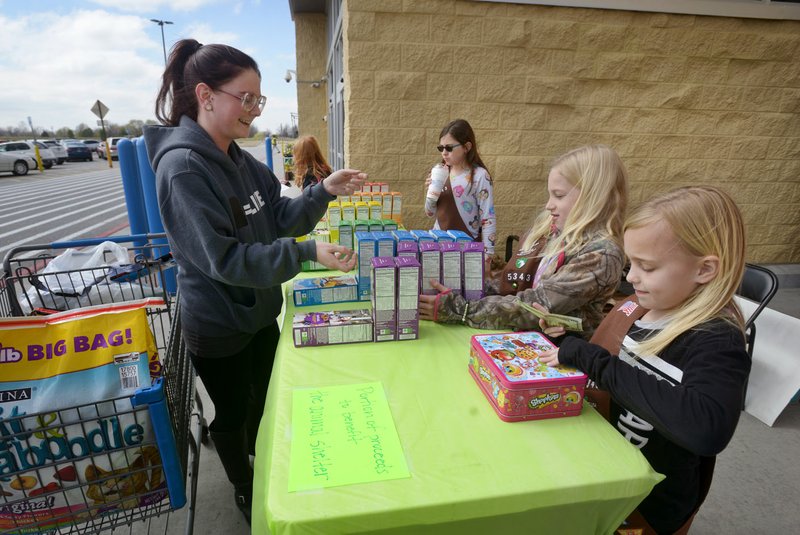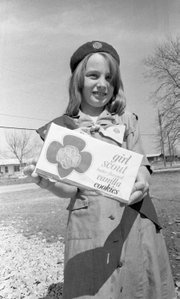Thin Mints have always been the favorite.
"People knew when we were coming, and they knew they had to get the mints before they were all gone," said former Girl Scout Debbie Van Pelt of Springdale.
Cookies are still available!
Girl Scout office
8:30 a.m. to 5:30 p.m.
2080 E. Joyce Blvd., Fayetteville
695-1818
Nutrtitional information and recipes using Girl Scout cookies and more are available from the Girl Scouts USA website.
By the numbers
311,320 — Boxes of Girl Scout cookies sold this year in Fayetteville and surrounding area.
$1,300,000 — Money local Girl Scouts earned this year through cookie sales.
55 cents to 64 cents — Money per box of cookies each troop keeps.
Per cookie sold
29 percent — District programs, membership recruitment, volunteer recruitment and training.
26 percent — Cost of cookie.
18 percent — Proceeds for troops and service units.
17 percent — Camps and property.
10 percent — Administrative costs.
SOURCE: Girl Scouts Diamond Council
Girl Scouts and cookie lovers are celebrating the 100th anniversary of Girl Scout cookie sales this spring. The love got started in 1917 when the Mistletoe Troop in Muskogee, Okla., sold cookies they made in their own kitchens to fund projects, according to a history of cookies on the Girl Scouts of the United States of America website. They sold them in the local high school cafeteria as a service project. "Other troops took note, and the idea of Girl Scouts selling cookies took off," the site reads.
In the 1920s, mothers and scouts baked simple sugar cookies, packed them in wax paper bags, sealed them with stickers and sold them door to door for 25 to 35 cents a dozen.
In the late 1930s, so many people wanted what were now called "Girl Scout cookies," "girls and their families could no longer bake enough cookies for everyone. So commercial bakers were called in to help make the popular confections."
During World War II, cookie ingredients like eggs, milk, sugar and chocolate were in short supply. Girl Scouts sold war bonds and calendars instead.
In 1951, girls began selling cookies from tables in shopping malls.
For those Thin Mint lovers, 1959 was a good year. The venerable favorite made its debut. And the peanut butter sandwich cookie -- now called Do-si-dos -- was on the menu by 1966.
LOCAL FLAVOR
Girl Scouting got its start in Fayetteville in 1920, Rogers in 1932 and Springdale in 1935, according to a timeline in the files of the Shiloh Museum of Ozarks History in Springdale. The timeline first mentions cookies in 1962, with vanilla butter, assorted sandwich, mint, round-up cookie and fudge-filled. Frosted spice was added in 1965.
The timeline records 84,360 boxes of cookies sold in 1977, and 97,716 boxes, for $56,298.76 profit, the next year. By 1981, sales averaged 65 boxes per girl, with 18,286 cases sold in 1983 and $120,000 earned in 1982. About 3,000 girls in Northwest Arkansas joined Girl Scouts in the early 1980s.
Papers from the Washington County Historical Society in the files of the Shiloh Museum record the first cookie sales by the North Arkansas Girl Scout Council in 1959, at 50 cents a box. The price was raised to a dollar a box in 1972.
Girl Scouts from Daisies to Seniors sold 12 varieties of cookies this year -- including a gluten-free choice. The gluten-free cookies sold for $5 a box, and the others were $4 a box.
Far from that table in the high school cafeteria to door-to-door sales, today's cookie lovers can get their favorites online and through a mobile app. But the cookie sales still help troops earn money for fun, educational activities and community projects.
"Each year, the cookie money is used to pay for badges, any materials we need for projects -- such as crafts -- fees to participate in badge workshops and field trips," said Kelly Barnett, leader of Brownie Troop 5343 in Springdale. For example, the young girls spent a night last summer camping in a member's backyard and eating s'mores made over a fire pit.
"I try to keep the costs down for parents, so the troop pays for as many things as we need for the girls to participate in the events and have fun learning," Barnett said.
And the troop will use part of its cookie money to give back to the community through a donation to the Springdale Animal Shelter.
"From the very beginning, the Girl Scout cookie program -- and Girl Scout cookies -- has been the engine that powers Girl Scouts," reads the Girl Scout website.
MAKING G.I.R.L.S.
"The Girl Scout cookie program helps girls fulfill their dreams, follow their passions and change the world," reads a news release provided by the Diamonds Council of Arkansas, Oklahoma and Texas. "[Cookie sales] play a huge role in transforming girls into G.I.R.L.s (Go-getters, Innovators, Risk-takers Leaders) as they learn essential life skills that will stay with them forever.
"The sale of Girl Scout cookies has made an indelible impact on the millions of Girl Scout alumnae who have sold them," the release adds. "In fact, 57 percent of Girl Scout alumnae in business say the program was key in the development of their skills today."
"I remember the sheer terror [of asking]," said Sandra Keiser Edwards, deputy director of Crystal Bridges Museum of American Art in Bentonville. "But I've never been scared to talk to people since then. It helped me understand how to meet people and how to hold an engaging conversation."
Van Pelt, a dental hygienist at J. Parham Dentistry, agreed. She claims she was shy and made her younger sister, Linda, ask folks if they wanted to buy Girl Scout cookies. "But people were always really nice."
Edwards said she and her mother role-played sales at home, and her mother set up her with neighbors she knew but the young girl didn't. "I took cookies to several houses close by, and they were receptive," Edwards said. "A lovely woman bought some cookies, just like we had role-played. It got me over my fear. I now know how to present myself. It's a part of life."
Martha Aranbel of Fayetteville said her daughter, a 10th-grader at Fayetteville High School and a Girl Scout Senior, has an outgoing personality. "And I'd like to credit Girl Scouts for that," she said. Her daughter has learned "how to get out and talk to people, how speak to them in a conversation.
"I told her don't be afraid to go up and talk to people. It's also a great way to learn new skills, such as money management and goal setting," Aranbel continued. "And now that sales are online, she's learning about technology."
Today's Girl Scouts sell cookies to relatives, close friends and neighbors by taking orders, with the cookies delivered about a month later. But that's not the way Van Pelt sold them.
Her father, the late Bob Collins, retired as a senior vice president of Jones Truck Lines in Springdale. Collins would take his daughters out to the truck dock to sell cookies to JTL employees. They also sold door-to-door in their neighborhood just south of what is today Northwest Medical Center.
"We wore our uniforms," Van Pelt said. Instead of taking orders, in the 1960s, the girls carried cardboard crates that held about 12 boxes of cookies, each selling for about 50 cents, she recalled.
"Sometimes, we had to go back to our car to get more, and sometimes we had to get more from the cookie lady [troop cookie chairman.] We were always leaders in our troop. We sold a bunch."
Sara Eichmann of Fayetteville sold cookies as a Brownie and Junior Girl Scout in the early 1980s. "We took orders, and I went door-to-door -- although never to a house I didn't know." She sold in her own Fayetteville neighborhood and in those of both sets of grandparents. "Every year, they would remind me to make sure I sold them cookies," she recalled.
Eichmann remembered earning patches for selling cookies and earning bars for 200 or 300 boxes sold to put under the patch. "I sold over 300 boxes," she said.
"I lived in rural Virginia, so I couldn't sell to neighbors," said Edwards, noting she sold mostly to aunts and uncles..
"In the 1960s, your parents wouldn't buy the cookies for you," she continued. "It was your responsibility to sell the cookies -- it was like a merit badge. You were a Girl Scout, so you sold cookies. You were given so many boxes, and you had to sell them."
Aranbel's daughter sold door to door this year to close neighbors, and her dad takes a cookie order sheet to work and puts it on the bulletin board in his office backroom. "You don't have to do much. People love them, and they keep coming, and we keep selling. But we do personally deliver them," Aranbel said.
Cookie sales make up most of the money a troop has for activities. Her daughter's troop uses it for camping several times a year and float trips.
"[Selling cookies] is kind of fun, too," Aranbel said. "And from the booth sales, she has a lot of memories. It's fun to be with the other girls."
NAN Our Town on 04/13/2017




